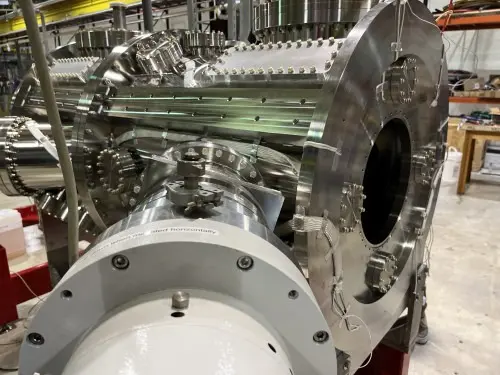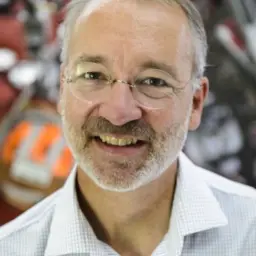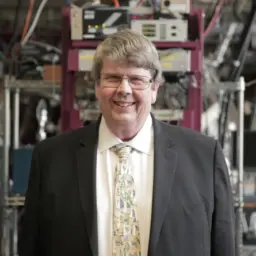A pair of startups with University of Wisconsin–Madison roots have received large federal grants to support their efforts to develop clean energy through fusion.
Realta Fusion and Type One Energy Group, both based in the Madison area, were two of eight ventures from across the nation that the U.S. Department of Energy selected for grants worth millions of dollars to support research and development of fusion energy technologies. Earth-based fusion energy, which seeks to mimic the nuclear fusion that powers the stars, could someday provide a source of clean, safe and virtually limitless power and heat.
One-quarter of the companies chosen for this federal investment are based in Wisconsin, reflecting UW–Madison’s leading role in fusion research to generate renewable and reliable energy as the United States strives to reduce its reliance on fossil fuels.
“UW–Madison is creating valuable partnerships in this potentially transformative option for meeting the energy needs of future generations,” says Amy Wendt, associate vice chancellor for research in the physical sciences. “With growth in innovative public-private partnerships for fusion research, we are looking forward to building on UW’s strong history and growing global leadership in the science and technology that will enable the realization of fusion power.”
 Realta Fusion is developing fusion technology that uses a magnetic mirror to control plasma. Its design is based on an experimental device developed at UW–Madison, pictured here. Credit: Realta Fusion.
Realta Fusion is developing fusion technology that uses a magnetic mirror to control plasma. Its design is based on an experimental device developed at UW–Madison, pictured here. Credit: Realta Fusion.
Both Realta Fusion and Type One Energy Group are pursuing fusion energy based on technologies pioneered by researchers at UW–Madison.
As a recent TechCrunch article notes: Wisconsin has quietly become a hotbed of fusion power startups. “The secret behind the state’s recent success isn’t so secret: University research programs that have been quietly cranking away for decades are now seeing the fruits of their labor emerge from the lab,” writes Tim De Chant for TechCrunch.
Realta is working to develop fusion energy and heat for industrial applications via a compact but powerful magnetic mirror as an early step toward larger-scale fusion applications. The company was spun out of a federally funded research project housed in the Department of Physics and led by physics professor Cary Forest.
“Wisconsin is extremely well positioned to lead in the commercialization of fusion,” says Forest, who co-founded Realta and serves as its chief science officer.
UW–Madison’s fusion program began in the 1960s and includes researchers in multiple departments, including physics, engineering physics, and electrical and computer engineering. Together, the departments have awarded hundreds of doctoral degrees to fusion researchers, including to “many of the world’s leaders in the field,” Forest adds.
 Cary Forest. Credit: Jeff Miller.
Cary Forest. Credit: Jeff Miller.
Meanwhile, Type One Energy Group is working to develop fusion energy that builds on the Department of Electrical and Computer Engineering’s long-running stellarator experiment, which also uses high-powered magnets to confine plasma.
“The engineering and operational attractiveness of the stellarator approach to fusion energy taken by Type One provides a path to commercialization without the need for a new large-scale science facility,” says David Anderson, an emeritus professor of electrical and computer engineering and Type One’s vice-president and chief engineer.
The technologies under development at Realta and Type One have also received support via UW–Madison’s UW2020 research awards, which are administered by the Office of the Vice Chancellor for Research and Graduate Education and primarily funded by the Wisconsin Alumni Research Foundation.
 David Anderson
David Anderson
“We are proud to see that campus efforts to grow fusion energy research opportunities are showing results,” says Wendt. “This is the Wisconsin Idea in action as we get closer to moving fusion energy from our laboratories into powering our communities.”
Announced May 31, 2023, the latest federal awards add to millions of dollars of private funding recently raised by both startups. Realta has announced $9 million from Khosla Ventures, a California-based venture capital firm, along with additional funding from WARF, through which its fusion technology is licensed. Type One Energy also recently announced that it raised $29 million in a seed financing round from private investors.
Both companies are pursuing potentially simpler and more cost-effective paths to commercializing fusion energy. As they get closer to that goal, UW–Madison’s decades-long leadership in the field places Wisconsin at the leading edge of a potential new energy sector.
“UW–Madison has a reputation as one of the leading places in the world for plasma physics and fusion research, and local companies are emerging from that knowledge base,” says Forest. “Match that to the deep expertise in manufacturing in the state and we have the key ingredients to make Wisconsin the global hub for fusion.”
Featured image caption: Type One Energy Group is working to develop fusion energy that builds on the Department of Electrical and Computer Engineering’s long-running HSX stellarator experiment, pictured, which uses high-powered magnets to confine plasma.
A version of this story was originally published by University Communications.